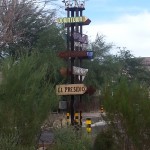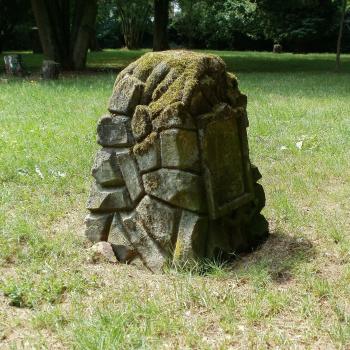An article I was reading today about hedge witchery stirred up some old thoughts about the role of ‘woo’ and how it is often approached within our communities. How we react to spirit activity and god-bothering, how we handle the ‘weird’ stories and experiences – depending on where you go, the reaction to these things will vary widely.
It seems a lot in discussions of where ‘woo’ belongs in the community and in our practices that a dichotomy is presented: either a) we believe in spirits and gods literally and entirely or b) we don’t believe in them at all. Binaries can be frustrating and erasing and leave most people stranded somewhere in the middle, though, so I’m going to attempt to post a more varied approach to woo, spirits, and such.
Upfront, I am one of those people who have had those ‘weird’ experiences and discuss spirits as if they were real, independent beings that don’t rely on my acceptance to exist. I’ve always had that belief because it has always been my experience. I want to make it clear that I don’t expect anyone else to hold that belief, as no one else has had the same experiences as myself (and even if they did, how we interpret those experiences would lead to different places!) – but I feel it’s important to be upfront about how I view the gods and spirits. My own biases will inevitably show through no matter how inclusive I attempt to be.
Even for most people who have had experiences that lead to active participation in woo or spirit interaction, there are going to be times when they wonder how ‘real’ the spirits or entities are. This is actually a good thing and will keep you from running willy-nilly after every sock puppet your mind makes and any goose-chases that could be avoided if you stopped to think. There is no one I know who completely, always, all the time believes that everything they encounter is an outside entity. Discernment is a great thing. It is important to not beat yourself up for articulating a belief in the spirits or gods after experiencing them, but questioning is quite different from that. Doubt is hardly evil.
At the same time, it is absolutely rude and unnecessary to force your belief or non-belief onto another person for any reason. If you don’t believe the deities exist as more than archetypes or mental sock puppets, that’s totally fine. If you believe they are archetypes that can influence your life, that’s fine too. If you believe in them literally, cool as well. Shoving how you think the world works onto another person is the problem, bottom line, for any of it.
Some people consider the spirits and/or gods sort of psychological tools – archetypes, parts of consciousness that can be named and seem external or autonomous but aren’t. The spirits are here often viewed as useful to a person as they work through trauma or personal issues and develop themselves into a better* human being. This sort of thinking seems common in quite a lot of published books on Wiccish witchcraft and/or Paganism and can tie in with monism. This can flow into more atheistic thought – spirits don’t exist at all – and/or flow into a more literal belief that these entities exist outside of the self.
We also have the belief that the spirits don’t exist on any level at all, except perhaps in the imagination. This is also a common approach in Paganism and magic, where ritual or spells work as more ‘placebo’ than anything else. The spirits may be viewed as useful (people are using imagination to help work through issues), neutral (don’t exist so it doesn’t matter), or harmful (belief and interaction with spirits that don’t exist being delusional or dangerous or damaging). This can ooze and flow into archetypal belief too – just like people who believe in spirits, nothing is ever cut and dry, always, all-the-time certain.
Of course, there aren’t just three ‘options’ either. Experience will always be more complicated than that, as will our ability to articulate that experience, and how we process our experiences. And people anywhere on the spectrum can have useful conversations with those who seem to hold an ‘opposing’ viewpoint. As I said in the last post, it always comes down to respect and whether you can respect someone else and the life they have lived.
This does not mean you have to go around stamping everyone’s experiences and beliefs with a blind acceptance mark. It does mean, though, that you should keep in mind that, regardless of what you believe, a person’s experiences are valid and real to them. There is nothing wrong with asking questions, posing alternatives, and voicing your own thoughts. That is a good thing and hearing many voices will help newcomers develop a better sense of critical thinking. But it is also important to remember that outright denial of spirit activity or god-bothering or what have you can be harmful, and there are much better ways to approach the issue than, “Spirits aren’t real, that didn’t happen,” or, “Why would the spirits bother you?”/”You must have done something to deserve the problems you’re having.”
Instead, it is infinitely more helpful to approach the issue in personal statements – “I don’t believe that spirits exist – but your experience sounds similar to [x] experience I had and therapy helped.” Or, “My experiences when first staring spirit work were [x], and I can offer advice for what to do if you’re being bothered.” Or, “I know someone who went through something like that, maybe they can help!” It also helps to understand how another person approaches the issue, where they feel they stand in terms of whatever they are discussing.
Ultimately, the language is going to shift depending on what you believe. I speak very differently when talking to spirit-workers than I do with atheist friends who are interested in what I do. And help can come from people who don’t believe what you do – someone who focuses more on archetypes can point out symbolism that is obvious but you missed because you’re too caught up in what you’re doing. That’s what makes discussions and dialogue awesome, and it’s part of why we shouldn’t mock the varying beliefs supposedly ‘under the Pagan umbrella’ even if we can’t understand them.
–
[*better meaning whatever it means to you personally]
















